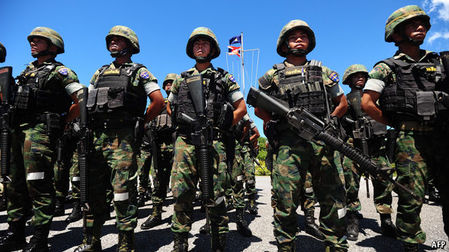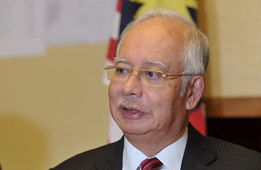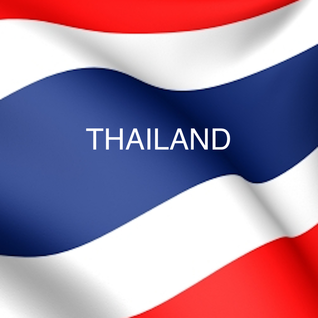|
Bulletproof? Thailand’s economy
เศรษฐกิจกันกระสุน / เศรษฐกิจโดยทหารไทย 20 February 2017 GDP data out today will show that South-East Asia’s second-largest economy grew 3% in the fourth quarter. Although that is slower than almost everywhere else in the region, the junta will be pleased because it was higher than expected, and their policies—in particular, a splurge on infrastructure and cash transfers to millions of low-income households—are in part responsible. Growth is likely to stay above 3% in 2017, thanks to foreign tourists’ cash, tax cuts, public spending on mega-projects in Bangkok and more transfers to the provinces, and the economy looks set fair for a while: a labour shortage will keep unemployment low, foreign reserves are ample and a massive current-account surplus bolsters the baht. But the longer-term cost of military rule is rising. Foreign investment has collapsed and, faced with low growth at home, Thai firms’ direct investments overseas leapt five-fold last year. สรุปย่อ: ตัวเลขแสดงอัตราการเติบโตทางเศรษฐกิจของไทยประกาศออกมาแล้ว อยู่ที่ 3% ไม่สูง แต่ก็สูงกว่าที่คาดไว้ และคาดว่าจะคงที่ 3% ไปตลอดปี 2017 ทั้งนี้ก็เพราะแรงกระตุ้นจากการท่องเที่ยวและโครงการก่อสร้างโครงสร้างพื้นฐานทางเศรษฐกิจต่างๆ ทั้งในกรุงเทพและในต่างจังหวัด การจ้างงานดี ตัวเลขคนตกงานต่ำ เงินทุนสำรองระหว่างประเทศมีมาก ดุลบัญชีเดินสะพัดก็ดี ทำให้ค่าเงินบาทสูงขึ้น แต่การที่ทหารครองอำนาจการปกครองไปยาวจะเป็นผลเสียทางเศรษฐกิจระยะยาว เพราะความไม่มั่นใจทางการเมือง ส่งผลถึงความไม่มันคงทางเศรษฐกิจ การลงทุนจากต่างประเทศลดลงมาก การเติบโต 3% ก็ถือว่าต่ำมาก ส่วนนักลงทุนไทยก็ออกไปลงทุนในต่างประเทศปีที่แล้ว เพิ่มมากขึ้น 5 เท่า http://link.economist.com/view/5356c693899249e1ccb87cae5b218.30j/5fc20b8c |
|
By REUTERS
SEPT. 1, 2016, 6:18 A.M. E.D.T ASIA PACIFIC
Thai Government to Resume Peace Talks With Muslim Insurgents By REUTERS SEPT. 1, 2016, 6:18 A.M. E.D.T BANGKOK — Thailand's military government said on Thursday peace talks with Muslim separatists operating in the far south of the country would resume in Malaysia, but no agreement would be signed unless the insurgents observed a ceasefire. The separatists from the far-south Muslim-majority provinces of Yala, Pattani and Narathiwat have been blamed for an unprecedented string of bombings last month in several tourist towns that killed four people and wounded dozens. A decades-old insurgency in the deep south of predominately Buddhist Thailand flared in 2004 and more than 6,500 people have been killed since then, according to the independent monitoring group Deep South Watch. Talks between the government and insurgents began in 2013 under the civilian government of Prime Minister Yingluck Shinawatra but have stalled since the military overthrew her government in 2014. Defense Minister Prawit Wongsuwan said negotiations would restart on Friday in Kuala Lumpur, the capital of Malaysia which has been trying to broker negotiations. General Aksara Kerdphol, the Thai government's lead negotiator, told Reuters the rebels had to show good faith by ending violence. "I have been instructed to tell the groups that there must be a peaceful situation on the ground before we are willing to sign any document," he said. Malaysia's Bernama state news agency said Thai officials would meet representatives of the MARA Pattani "separatist umbrella group". Bangkok-based analyst Anthony Davis, at security consulting firm IHS-Jane's, told Reuters a ceasefire was unlikely as the main group behind the violence, Barisan Revolusi Nasional (BRN), had been left out of the talks. "BRN has made it entirely clear that they reject the current process of peace talks between Bangkok and the group of small factions-in-exile in Malaysia called MARA Pattani," he said. The three ethnic-Malay majority provinces were part of a Malay Sultanate before being annexed by Thailand more than a century ago. The Aug. 11-12 bombings in several towns including Hua Hin, Surat Thai and on Phuket island spread alarm in a tourist industry that had been largely spared a spill-over of violence from the insurgency. Authorities at first dismissed any connection between the bombs and the separatists and instead blamed the military government's mainstream political opponents. The attacks came days after voters approved a military-drafted constitution in a national referendum. The charter was roundly opposed in the far south. (Reporting by Panarat Thepgumpanat and Patpicha Tanakasempipat; Writing by Cod Satrusayang; Editing by Robert Birsel) |

The Economist explains Explaining the world, daily The Economist explains Why does Thailand keep changing its constitution? Sep 11th 2016, 23:50 BY THE ECONOMIST IN AUGUST voters endorsed Thailand’s latest constitution in a tightly controlled referendum that offered no alternative to the draft put forward by the ruling military junta. It may take a year before the rubberstamp assembly ratifies it. By the time it comes into force, it will be the country’s 20th constitution in 85 years. Why does Thailand keep changing its constitution? In a word: coups. Since the replacement of its absolute monarchy with a nominally constitutional one in 1932, the army has been Thailand’s most powerful political force. It has usually wielded its power in symbiosis with a traditional elite comprising the monarchy, aristocrats and interrelated wealthy families. The civilian elites have provided a cloak of legitimacy and administrative skill, while the army has supplied the means of suppressing those who wish to be ruled by neither group. But Thailand’s close diplomatic, military and economic ties with America and other Western countries, combined with calls from Thai citizens for greater representation, have required keeping up democratic appearances. This has led to a cycle of liberalisation, growing political participation and eventually elite-backed military coups to claw back power from politicians. But clinging to power for too long carries its own risks, so coupmakers must find ways to step aside without relinquishing the benefits they seized. Hence the importance of constitutions, whose purpose is to consolidate a coup’s gains. The 2007 constitution, which followed a coup the previous year against Thaksin Shinawatra, then the prime minister, created an array of appointed “independent” bodies and politicised courts that brought down three democratically chosen prime ministers including his sister, Yingluck Shinawatra. That wasn’t enough to neutralise Mr Thaksin’s popularity. So after a 2014 coup against the remnants of Yingluck's government, which had been elected in 2011, the latest constitution goes even further to hobble elected politicians. Which is not to say that Thai charters fail to go on at great length about citizens’ rights and obligations and other constitutional boilerplate—the current one, the longest yet, is 105 pages. Their principal function, however, is to divide the spoils of power between the army and elites while leaving everyone else enough crumbs to prevent rebellion. To satisfy the army, a constitution must not take away too much of its post-coup privilege. To satisfy traditional elites, a constitution has to perpetuate their control over the bureaucracy and guarantee the power of the monarchy, from which their benefits trickle down. For most others—as the relatively wide margin of victory for last month’s referendum seems to indicate—a constitution can win approval simply by offering a chance at political participation, even if the game is rigged. In their eagerness to make up for the “wasted coup” of 2006, however, this constitution’s drafters appear to have overreached. The new electoral system is designed specifically to stifle parties linked to Mr Thaksin, who remains hugely popular, and whose supporters have been prevented from protesting by harsh restrictions. The generals’ plans to lead the government after elections also threaten a rift with their royalist allies. Strains in the relationship have emerged, with pro-coup politicians openly criticising the junta’s leadership and its charter. In the 1990s a similar rift led to the relatively democratic constitution of 1997, a product of elites’ misguided belief that they could rule without military help. If the purpose of a Thai coup is to turn back the clock, the point of the constitution that follows is to freeze the hands in place. The generals have proven they can accomplish the first task efficiently, even as the second is likely to remain beyond their abilities. http://www.economist.com/blogs/economist-explains/2016/09/economist-explains-4?cid1=cust/ddnew/n/n/n/20160912n/owned/n/n/nwl/n/n/AP/email&etear=dailydispatch Monday October 3rd, 2016
A new moral order: Thailand The Central Court for Corruption and Misconduct will open today. The 20-plus judges will speedily try cases against wayward public officials, which tend to get bogged down in the existing court system. Prayuth Chan-ocha, Thailand’s putschist-turned-prime-minister, aims to make the country corruption-free by 2036. That is a tall order. In 2015 Thailand ranked 76th on Transparency International’s annual graft rankings. Real change is still distant. Last month, more allegations emerged about generals’ family members; they include business dealings by relatives of the prime minister’s brother (all involved deny wrongdoing). And the new court is a political sham. The army officers who run Thailand argue that politicians are corrupt and democracy doesn’t work, which is why they seized power. Under the new order, only “accomplished people” who are beyond politics—and above the law—will provide moral leadership. And the more important they are, the less they will worry about the new court. Friday September 2nd, 2016
Keeping up appearances: Thailand Today, government representatives will hold talks in Kuala Lumpur with an exile outfit claiming to represent Malay-Muslim separatists in Thailand’s southernmost provinces. But the talks are a travesty. Hardliners from the biggest and most heavily armed rebel group, the Patani-Malay National Revolutionary Front, will not attend. Thailand’s generals will not contemplate devolution, or a separate non-Thai identity for ethnic, linguistic and religious minorities. They fear that the rebels’ demands for outside arbitration could trigger partition. Annexed by Thailand in 1902, the former Sultanate of Patani is home to 2m people, 80% of them Malay-Muslims. Asia’s deadliest internal conflict has killed 6,500 people, most of them civilians. The talks follow deadly bomb attacks outside the usual conflict zone, culminating in one in the royal resort of Hua Hin on the queen’s birthday. A new crop of young separatists may be losing patience with their ageing comrades—and with the Thai state. Thursday September 8th 2016
Trust deficit: Najib Razak in Thailand As the Malaysian prime minister starts a two-day visit, Asia’s deadliest internal conflict—in Thailand’s southern Muslim provinces—will dominate talks. Bangkok’s assimilation policies have failed and Thailand wants assurances that Malaysia will stand firm against Malay-Muslim separatists who want autonomy. Malaysia in turn will probably remain noncommittal. More concretely, the countries will agree to build a wall along their 500km border; it will do little to stem the smuggling of goods and people. Not bad neighbours, but never really close, the nations’ mutual distrust means that much will remain unsaid. Malaysia is worried that Thailand’s junta, lacking democratic legitimacy, will resort to nationalism and supremacist Buddhism, and fail to show real tolerance for the nation’s Muslims. The Thai generals will be polite enough not mention their proudest achievement: a new political system that keeps the hands of greedy politicians out of the till. 
Nab to visit Thailand on Friday
Borneo Post September 8, 2016, Thursday Datuk Seri Najib Tun Razak KUALA LUMPUR: Prime Minister Datuk Seri Najib Tun Razak will make an official visit to Thailand on Friday for the sixth annual consultation between the two countries, the foreign ministry said today. It said in a statement that the meeting would discuss various issues, including security cooperation, trade and investment, interlinkages between the two countries and delineation. It would also discuss agricultural cooperation, 3E initiative in south Thailand and infrastructure projects in the border areas. “As close neighbours and partners in ASEAN, Malaysia and Thailand always ensure close cooperation in various sectors,” it said. The annual consultation would be the first between Najib and his counterpart General Prayut Chan-o-cha.Najib would be accompanied by his wife, Datin Seri Rosmah Mansor, Foreign Minister Datuk Seri Anifah Aman and several cabinet ministers and senior government officials. During the visit, Najib would attend a restricted meeting with Prayut, followed by a delegation meeting and official dinner hosted by Prayut and his wife Naraporn Chan-o-cha. The annual consultation is an important mechanism to strengthen the bilateral ties in which the fifth annual consultation was held in Putrajaya on Feb 28, last year. Thailand is Malaysia’s fifth biggest trading partner in the world and second in ASEAN last year with total trade of RM88.72 billion (US$22.09 billion).– Bernama http://www.theborneopost.com/2016/09/08/najib-to-visit-thailand-on-friday/?platform=hootsuite |







